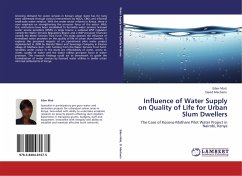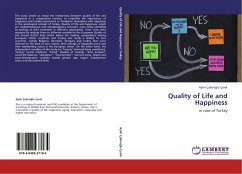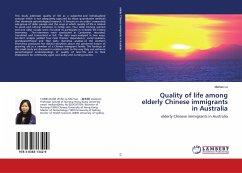
Influence of Water Supply on Quality of Life for Urban Slum Dwellers
The Case of Kosovo-Mathare Pilot Water Project in Nairobi, Kenya
Versandkostenfrei!
Versandfertig in 6-10 Tagen
32,99 €
inkl. MwSt.

PAYBACK Punkte
16 °P sammeln!
Growing demand for water services in Kenya's urban slums has for long been addressed through various interventions by NGOs, CBOs and informal small-scale water vendors. With the water sector reforms in Kenya, there is now emphasis on strengthening the pro-poor focus of the sector. With this, institutions have been established to formalize water services: licensed water service providers (WSPs) in large towns; a national WSP regulator namely the Water Services Regulatory Board; and a WSP pro-poor financier namely the Water Services Trust Fund. This study assesses the influence of formalized wat...
Growing demand for water services in Kenya's urban slums has for long been addressed through various interventions by NGOs, CBOs and informal small-scale water vendors. With the water sector reforms in Kenya, there is now emphasis on strengthening the pro-poor focus of the sector. With this, institutions have been established to formalize water services: licensed water service providers (WSPs) in large towns; a national WSP regulator namely the Water Services Regulatory Board; and a WSP pro-poor financier namely the Water Services Trust Fund. This study assesses the influence of formalized water provision on the quality of life of urban slum dwellers. It explores the perceived impacts of an operational pilot water project implemented in 2009 by Nairobi Water and Sewerage Company in Kosovo village of Mathare slum, with funding from the Water Services Trust Fund. Variables under review in the study are affordability of water, access to water, quality of water and the water utility's pro-poor focus in water provision. The research findings could act as benchmark to guide the formalization of water services by licensed water utilities in similar urban informal settlements of Kenya.












